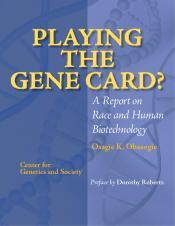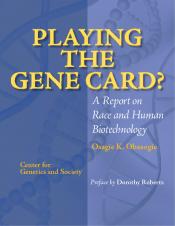Racial Justice
Biologists and social scientists agree that race is a social category, not a biological or genetic one. Yet the idea that genetic lines can be drawn between racial groups continues to make its way into human genetic research and biotechnologies. Examples can be found in some genetic studies on racialized health disparities, direct-to-consumer genetic ancestry tests, and race-specific drugs. These products and practices are both inaccurate and socially pernicious when they reduce race to a set of biological markers and fail to address racism and the social, political, environmental, and economic inequalities that continue to make race a salient social category.
Image of Sonoma State Home, site of the highest number of eugenic sterilizations in California, courtesy of Alexandra Minna Stern...
Bill McKibben and john a. powell came discuss the “Climate Crisis, Designer Babies, and Our Common Future.” The event was moderated by Osagie K. Obasogie, Professor of Bioethics at UC Berkeley.
A new survey has found implicit biases in medical students that may explain why black patients are sometimes under treated for pain, with some students believing that black people feel less pain and have thicker skin than white people.
The resurgence of race as biological concept is one of the most pressing social justice challenges raised by recent developments in genetic science and technologies. Dorothy Roberts, noted professor of law at Northwestern University, discusses her efforts to communicate this trend, and to place it within broad social and political contexts in the United States, in her recently published book Fatal Invention: How Science, Politics, and Big Business Re-create Race in the Twenty-first Century. Dorothy is interviewed by UC Berkeley associate professor of bioethics David Winickoff.

Playing the Gene Card?
|
||
|
Osagie Obasogie is available for interview. His recent appearances include Forum with Michael Krasny (KQED), The Jeff Farias Show, and The Cliff Kelley Show (WVON). |
||
|
About the Author Osagie Obasogie, JD, PhD, is Senior Fellow at the Center for Genetics and Society; Haas Distinguished Chair and Professor of Bioethics in the Joint Medical Program and School of Public Health at the University of California, Berkeley. Read more
|





